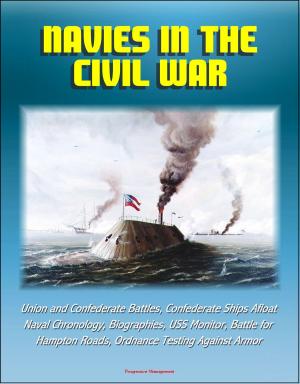Jimmy Doolittle: The Commander Behind the Legend - Operational Effectiveness, Tactical and Technical Innovation, Leading the Eighth Air Force, Raid on Tokyo, World War II Air Offensive Against Germany
Nonfiction, History, Military, Aviation, World War II| Author: | Progressive Management | ISBN: | 9781370905331 |
| Publisher: | Progressive Management | Publication: | September 9, 2016 |
| Imprint: | Smashwords Edition | Language: | English |
| Author: | Progressive Management |
| ISBN: | 9781370905331 |
| Publisher: | Progressive Management |
| Publication: | September 9, 2016 |
| Imprint: | Smashwords Edition |
| Language: | English |
This excellent report, professionally converted for accurate flowing-text e-book format reproduction, evaluates Jimmy Doolittle's performance as an operational air commander. As one of the most well-known Airmen of the twentieth century, Doolittle is the subject of a significant number of books and articles. Despite their many virtues, these efforts have largely overlooked a very important portion of his life—his command of the Eighth Air Force. This study seeks to fill that gap. It draws upon multiple sources, including the mature body of biographical literature, archival documents, and Doolittle's personal and military records.
The study reveals that in January 1944, prior to his assumption of command of the Eighth Air Force, Doolittle lacked the administrative skills and bureaucratic experience typical of most senior officers. His legendary raid on Tokyo had, however, demonstrated his technical expertise, courage, and strong personal leadership. In evaluating Doolittle's operational effectiveness as Eighth Air Force commander, the study assesses his efforts to gain air superiority in Western Europe, manage aircrew rotation, and improve the effectiveness of bombing in close proximity to friendly forces. It concludes that Doolittle's aggressive, yet mature, command demeanor placed effectiveness above efficiency and extracted the "highest profit" from his forces in their effort to defeat the enemy. The evaluation progresses with an appraisal of Doolittle's influence on tactical and technical innovation. In this arena, he had mixed success innovating technically, but his tactical initiatives significantly enhanced the air offensive against Germany. The final portion of the study explores Doolittle's leadership, examining his command environment, his leadership approach, and the measures he took to sustain the morale of his command. The analysis reveals that Doolittle adroitly managed his force's morale, while remaining steadfast in his determination to defeat the Luftwaffe.
The overall conclusion is that behind Jimmy Doolittle's daring and dashing facade was a measure of humility that fostered his growth as a general officer. Although his technical expertise forged trails in aviation history, it was Doolittle's moral qualities that most significantly hastened the demise of the Luftwaffe. This finding suggests that while it is indeed prudent to foster the technical education of future senior leaders, it is even more important to nurture leaders of courage, boldness, and humility.
This excellent report, professionally converted for accurate flowing-text e-book format reproduction, evaluates Jimmy Doolittle's performance as an operational air commander. As one of the most well-known Airmen of the twentieth century, Doolittle is the subject of a significant number of books and articles. Despite their many virtues, these efforts have largely overlooked a very important portion of his life—his command of the Eighth Air Force. This study seeks to fill that gap. It draws upon multiple sources, including the mature body of biographical literature, archival documents, and Doolittle's personal and military records.
The study reveals that in January 1944, prior to his assumption of command of the Eighth Air Force, Doolittle lacked the administrative skills and bureaucratic experience typical of most senior officers. His legendary raid on Tokyo had, however, demonstrated his technical expertise, courage, and strong personal leadership. In evaluating Doolittle's operational effectiveness as Eighth Air Force commander, the study assesses his efforts to gain air superiority in Western Europe, manage aircrew rotation, and improve the effectiveness of bombing in close proximity to friendly forces. It concludes that Doolittle's aggressive, yet mature, command demeanor placed effectiveness above efficiency and extracted the "highest profit" from his forces in their effort to defeat the enemy. The evaluation progresses with an appraisal of Doolittle's influence on tactical and technical innovation. In this arena, he had mixed success innovating technically, but his tactical initiatives significantly enhanced the air offensive against Germany. The final portion of the study explores Doolittle's leadership, examining his command environment, his leadership approach, and the measures he took to sustain the morale of his command. The analysis reveals that Doolittle adroitly managed his force's morale, while remaining steadfast in his determination to defeat the Luftwaffe.
The overall conclusion is that behind Jimmy Doolittle's daring and dashing facade was a measure of humility that fostered his growth as a general officer. Although his technical expertise forged trails in aviation history, it was Doolittle's moral qualities that most significantly hastened the demise of the Luftwaffe. This finding suggests that while it is indeed prudent to foster the technical education of future senior leaders, it is even more important to nurture leaders of courage, boldness, and humility.















